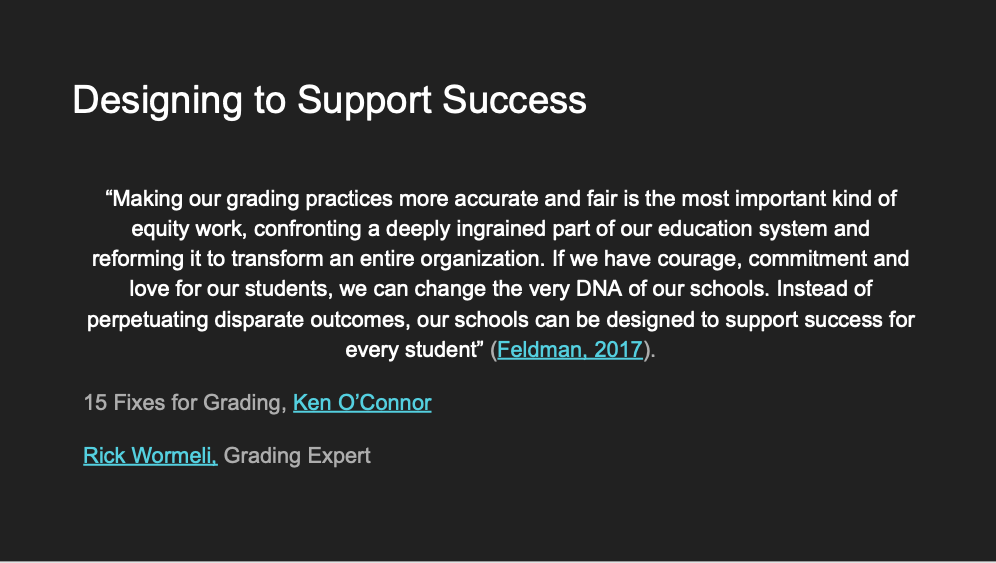 by James C. Sherlock
by James C. Sherlock
Virginia has a policy on grading of schools.
As far as I can tell, it does not have a definitive policy on grading of students other than on statewide tests and assessments.
That is left to the Divisions.
Yesterday I attempted to explain standards-based grading (SBG). Today I will take on what I view as a sales pitch that leverages SBG for purposes for which it was not designed.
P.T. Barnum was on to something.
A consultant named Joe Feldman started his business in 2013. He wrote in 2017 describing what he saw as an incontestable link between SBG and equity. He followed that up with a book in October of 2018 titled Grading for Equity.
Equity he said. I am sure his business picked up in the woke zip codes.
Sample scopes of work are conveniently offered. Customers can benefit from “partnerships.” They can access ”professional development,” “thought partnering,” “coaching,” “workshops and presentations,” et al.
Good to know.
He repositioned traditional grading as an artifact of systemic racism. No one had noticed that before.
Grading practices vary from teacher to teacher.
Grades provide unclear and often misleading information to parents, students, and postsecondary institutions.
Traditional grading practices are often corrupted by implicit racial, class, and gender biases.
Most teachers use grading practices that use mathematically unsound calculations that depress student achievement and progress.
He claims:
Grading becomes less subjective and inconsistent across teachers, more rigorous and holds students more accountable. More importantly, student failure rates decrease dramatically, particularly for students of color, from low-income families, and those with special needs – our schools’ most vulnerable populations.
Mr. Feldman also suggests
… grading policies actually help fuel achievement gaps, reinforcing the differences in family resources and support based on students’ race and income.
Those are startling claims. They are meant to be.
He never uses the word “may” in the claims above. All schools and all teachers are guilty. He clearly believes he needs a universal evil to sell his product. He offers a religious revival.
Then redemption. He claims a standards-based grading approach
… encourages revision and redemption instead of compliance and corruption.
Many of his target audiences would demand that. In certain blue precincts, it instantly became mandatory.
One of the adopters to which I referred earlier is Albemarle County. Its school board cited Mr. Feldman when it adopted SBG and Mr. Feldman’s rationale.
One of the presentation slides for that meeting:

“Grading Expert” Mr. Wormelli sells the same thing that Mr. Feldman does. He just sells it from Herndon. Who you hire is what you get.
Let’s see what they’ve got.
Mr. Feldman offers evidence that teachers who participated in the professional development that his firm sells gave fewer D’s and F’s and fewer A’s to their students than they did before their conversion.
It is the A/D/F comparison that they point to as a anti-racist outcome. Fewer D’s and F’s among minority students and fewer A’s among both white and minority students are offered as achievements of the system.
Does that reflect teacher Stockholm syndrome among the teachers after being told they were racists or better minority student performance at the lower end? The sample size and the characteristics of the sample schools don’t seem to tell us. At least one of them, Centennial College Prep Charter School (grades 6-8) (Los Angeles, CA), is 98% Hispanic.
Mr. Feldman’s company also offers in that same report that teachers improved the accuracy of grades compared to state standardized test results. Accuracy of grading is a worthy outcome, but the authors use it as a statistic without even suggesting that it has anything to do with race.
So, what he offers as evidence of the anti-racist superiority of SBG is that grades are more concentrated in the B and C range in the sample.
Some Divisions offer a hybrid approach. Fairfax County offers standards-based grading in elementary school. At higher levels, FCPS has two approved grading scales, the 4-point scale and the 100-point scale. FCPS Policy on secondary school grading still reflects a more traditional approach.
There is, of course, a movement in that Division to go full SBG.
Colleges don’t care. Virginia college admissions officers say it does not matter to acceptance whether a high school uses the traditional or SBG system. The response of JMU’s Director of Admissions Shawn Mooney is typical:
For us, it doesn’t matter what the grading scale is, because we tailor our admissions process to our knowledge and historical experience with the schools and school system. For instance, we have one person (me, in fact) who handles Southwest Virginia, and I am very, very familiar with the products of your schools. I know how a candidate compares to past candidates from the region.
Nothing points to SBG resulting in better understanding of the material. Crucially, nothing in the report suggests that students of any race understood the material — that they scored better on the state standardized tests — than they did before the switch.
You can be sure that outcome would be shouted to the rooftops if it were true.
What to do? SBG may or may not be a good idea, but the idea that traditional grading is racist is a sales pitch.
VDOE should attempt to measure results objectively based on SOL test results before and after changes to standards-based grading in the school districts that have made the shift. Also check drop-out rates and other indicators of school climate before and after.
Poll teachers experienced in both SBG and traditional grading for their assessments in a way that is not edited by the school divisions.
That is the only way we might know if SBG is worth the effort of switching and teacher workload costs.
I personally don’t know the answer, but we need to learn whether SBG is proven to improve either performance or the school climate or both. As I wrote earlier, I doubt it improves performance or we would hear nothing else.
Unfortunately, if SBG does not prove to improve student, teacher or school performance, we can be assured that other factors not within student or parent control will be deemed at fault.
It would be racist to think otherwise.


